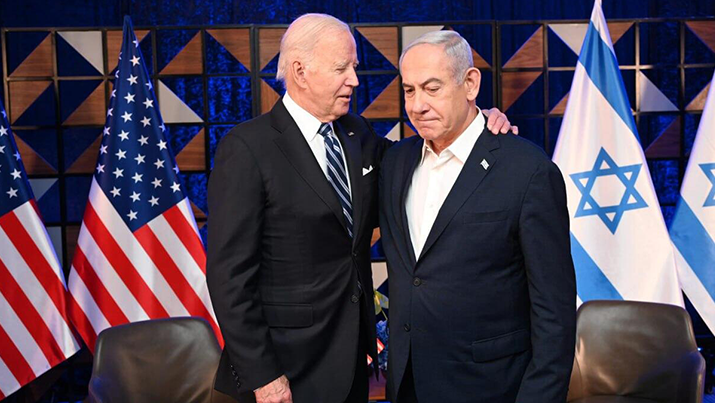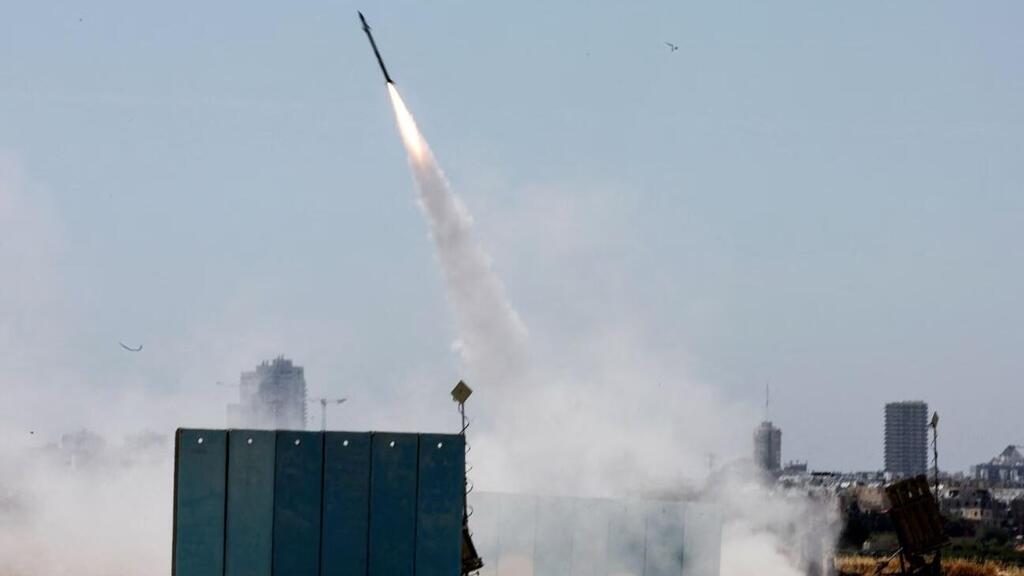Getting your Trinity Audio player ready...
Amid reports of increasing tension between the government of Israel and the Biden administration, it is worth taking a look at a report prepared by the Congressional Research Service about the assistance that the United States provides Israel as part of the overall relationship between the two countries.
More stories:
Dozens of pages detail programs amounting to more than $150 billion (not adjusted to inflation, hence realistically more), more than to any other country. This is before the special package the administration is requesting from Congress due to the war, some $14 billion, in addition to emergency replenishment of armaments, as well as the provision of ongoing international political support.
2 View gallery


In 2023, US assistance was 16% of Israel's defense budget; and aid is about more than money, it sends a strong message of American support
(Photo Haim Zach, GPO)
Procedures are in place which add to the bottom line. Aid to some countries matches the rate of expenditure, while the entire Israel package is deposited at the beginning of the year into an interest-bearing American account. And over the years America guaranteed Israeli loans, with the resultant lower interest rates benefiting each taxpayer.
While the amounts are significant – in 2023 American assistance accounted for 16% of Israel's defense budget, aid is about more than money: It sends an unequivocal message about America's strong backing of Israel. Moreover, U.S. law requires that Israel's qualitative military edge be maintained. In addition to the obvious benefit, the law has added value: It enabled Israel to develop an advanced security industry, and allowed it to become one of the world's largest weapons exporters.
It should be noted that, until 2007, Israel received significant economic assistance. Since then, almost all assistance has been directed to military needs, especially purchases in the U.S. "Almost" because there are some civilian programs, which over the years amounted to more than $1 billion. They pay for joint research and cooperation in fields as varied as agriculture, COVID and energy. The United Jewish Appeal receives money for immigrant absorption, and institutions like Hadassah and Shaare Zedek medical centers benefit from a program designed to encourage schools and hospitals abroad to operate to a high standard.
As for security assistance, it is based on Memoranda of Understanding which are renewed each decade. The first was signed in 1999, during the Clinton administration. The second was negotiated in 2007, under George W. Bush. According to the unprecedented third MoU, agreed upon with the Obama administration, every year the administration requests Congress to allocate $3.3 billion to Israel, and $500 million more for anti-missile defense, including the Iron Dome.
What will happen ahead of 2028, when the current MoU runs its course?
In its introduction, the Congressional Research Service document attributes American assistance to four factors. The first is historical: America has supported Israel since Washington recognized it, minutes after its establishment was declared. As for the three other factors, their fragility must be noted.
2 View gallery


$500 million is allocated for anti-missile defense, including Iron Dome.
(Photo: Reuters)
One is "joint democratic values." As Israel deepens its hold on the West Bank, further removing the option of a political solution, it hastens annexation (in deed if not in name), with all that implies for the local population, and Israel as a democracy. U.S. law forbids using American equipment when human rights are methodically infringed. Questions that arose in the past, for example, regarding using American equipment to destroy the homes of terrorists, were not translated into actions (and I will not dwell on American statements regarding the judicial overhaul).
"Joint strategic goals in the Middle East" is also on the list. To the extent that Israeli conduct does not match U.S. interests as it defines them, this element will be weakened. Expecting mutuality in relations, increasing voices in America call for aid conditional on Israeli compliance with certain U.S. requests.
Difficulties in the aforementioned could undermine the next factor, which is "robust American support for assistance to Israel." Support is indeed significant. But surveys indicate that it is higher among older respondents, and is decreasing among Democratic voters.
 Tova Herzl
Tova HerzlWhoever believes that Israel has alternatives to U.S. support, is convinced that we can do just fine on our own, or feels that "don't worry, everything will turn out fine," or "they need us more than we need them," and "we will stop selling them our technology" is exempt from drawing practical conclusions from all of the above.
Others are advised to consider how to respond to attitudes among young voters and to developments in the Democratic party, whose support for Israel has been consistent and remains vital. We should also take into account American interests, as we expect the United States to consider Israel's needs and wants. And it is required, even in these painful and challenging times, to give a thought to the future of human rights and democracy in Israel.
- Tova Herzl is a former Israeli ambassador to South Africa and the Baltic countries, and served as liaison between the U.S. Congress at the Israeli Embassy in Washington



